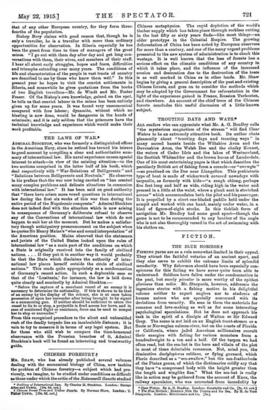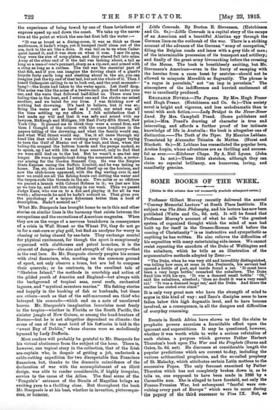FICTION,
THE BLUE noRIZON.f
FISHING yarns are as a rule somewhat limited in their appeal. They attract the faithful votaries of an ancient sport, and they also serve to exhibit the extreme limits of splendid mendacity. Why fishermen should have been especially con• spicuons for this failing we have never quite been able to understand. Soldiers have fallen under the condemnation in the past, but surely piseator is more worthy of the epithet gloriosus than miles. Mr. Stacpoole, however, addresses the ingenious stories with a fishing motive in his delightful volume neither to expert anglers nor to students of human nature who are specially concerned with its deviations from veracity. He sees in them the materials for romance and love-making as well as for some interesting psychological speculations. But lie does not approach his task in the spirit of a disciple of Walton or Sir Edward Grey. The scene is not laid on an English trout-stream or a Scots or Norwegian salmon-river, but on the coasts of Florida or California, where jaded American millionaires recruit their energies with fishing for various monsters from a hundredweight to a ton and a half. Of the tarpon we had often read, but the sea-bat is the hero and villain of the plot in most of these delectable romances. Not, mind you, the diminutive daetylopterus volitans, or flying gurnard, which Florio described as a "sea-swallow," but the sea-featherbeds of the Plates genus, of which the dictionaries coldly say that they have "a compressed body with the height greater than the length and winglike fine." What the sea-bat is really like in action may be gathered from the account of Knox, the railway speculator, who was converted from incredulity by • CI.. Waters. By A. G. Bradley. London, Conatable and Co. [7e. 6d. net] t The Bias /forum: Romano from the TrOpies and Ha Sse. fly II. de Vero Btacpoole. London Hutchinson and Col
o. [Ga.)
the experience of being towed by one of these leviathans at express speed up and down the coast. We take up the narra- tive at the point at which the sea-bat first left the water
"It was as broad as a dining-room, it was as thick as three mattresses, it hadn't wings, yet it humped itself clean out of the sea, took to the air like a dove. It was tail on to us when Cedar- quiet lanced it, and it was stem on when it rose. I saw its eyes, they were the size of soup-plates, and they stared full into mine. Away at the other end of it the tail was lashing about, a tail as long as a roan-e-war'S pennant, sharp as a rip-saw, and armed with a sting as long as a cutlass. The tail was the essential part of that fish, and if you can imagine the driving chain of a giant's bicycle forty yards long and slashing about in the air, you can imagine just the tip end of that tail, but not the whole of it. Then I heard Cedarquist calling to us to look out and the next moment- bang!—the brute had taken to the water again. Let itself drop. The noise was like the noise of a twelve-inch gun fired under your ear, and the wave that followed half-filled us. There were two baling-tins in the boat, and I seized one and the stroke oar seized another, and we baled for our lives. I was thinking now of nothing but drowning. It's hard to believe, but it was so ; firing the water out as hard as I could, my mind was all the time nettling up my affairs. I felt satisfaction that I had made my will and that it was safe and sound with my lawyers, Melleogh and Milligan, 103 East Forty-fifth Street, New York City. It pleased me to think they were a sound firm, and then I thought of the notices with the scare headlines in the papers telling of the drowning, and what the family would say, and what Wall Street would say. Yes, it all came through my head like that whilst I was working away like a nigger trying to turn the Gulf of Mexico out of the boat, and then, when the baling-tin scraped the bottom boards and the pumps sucked, so to speak, up I sat with life and hope renewed, only to find that we were still tied on to the bat But he wasn't a sea-bat say longer. He was a torpedo-boat doing the measured mile, a motor- car aiming for the Gordon Bennett Cup. He was the Empire State Express racing the Buffalo Limited, and he was taking on home. Yes, air, the coast had lifted itself up on the horizon, and now the club-house appeared, with the flag waving over it, and now we could see all the fishing-boats out dotting the water and the tarpon-rods like threads in the air. Two miles or so offshore we passed a launch with Colonel Holmes in it; we just saw him as we tore by, and left him rocking in our wash. Then we paased Judge Kane, who was on to a fish and playing it for all he was worth ; afterwards he said he hadn't noticed us. That gives you the psychology of a tarpon fisherman better than a book of description. Hadn't noticed no !"
What Mr. Stacpoole has brought home to us in this and other stories on similar lines is the harmony that exists between the occupations and the recreations of American magnates. When they are on the verge of a nervous breakdown in consequence of a crisis in Wall Street or the Wheat Pit, they do not go in for a rest-cure or play golf, but find an anodyne for worry in chasing or being chased by sea-bats. They exchange mental for physical excitement, for though the sport is sumptuously organized with clubhouses and petrol launches, it in the element of danger—the nice and strength of the quarry—that is the real lore. So Mr. Stacpoole cleverly peoples his scenes with rival financiers, who, meeting on the common ground of sport, not only observe a truce, but are led to compose their quarrels ; or he contrasts, in the excellent tale of "Skeleton Island," the methods in courtship and action of the gilded youth of America and England—but always with the background of tropical seas, coral reefs, enchanted lagoons, and "mystical monsters marine." His fishing stories end happily in the hooking of fish or husbands, but there are others—such as that of the self-marooned sea thief who betrayed his comrade—which end on a note of unrelieved horror. Mr. Stacpoole's imagination luxuriates moat freely in the tropics—whether in Florida or the South Pacific, the sinister jungle of New Guinea, or among the head-hunters of Borneo—but he is not altogether dependent on climate the scene of one of the moat lurid of his fafltasies is laid in the "sweet Bay of Dublin," whose charms were no melodiously hymned by Lady Dufferin.
Most readers will probably be grateful to Mr. Stacpoole for his virtual abstinence from the subject of the hour. There is, however, one topical story in the collection, that of the Irish sea-captain who, in despair of getting a job, undertook a cable-cutting expedition for two disreputable San Francisco financiers, but, thanks to the dramatic coincidence of the declaration of war with the accomplishment of an illicit design, was able to render considerable, if highly irregular, service to the cause of the Allies. The final scene of the 'Penguin's' entrance of the Straits of Magellan brings an exciting yarn to a thrilling clone. But throughout the book Mr. Stacpoole is at his beat, whether in invention, picturesque- ness. or humour.



































 Previous page
Previous page